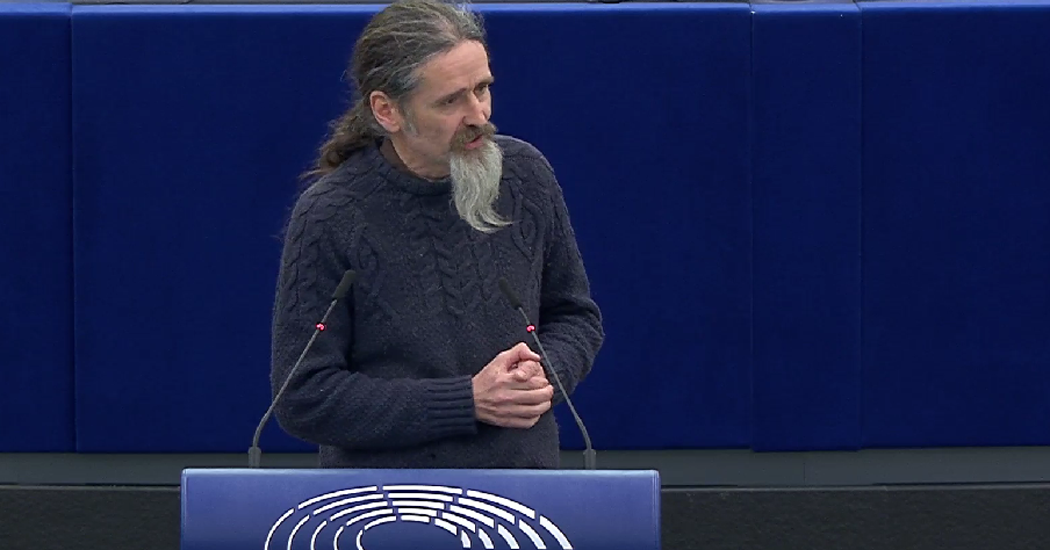The European Parliament petitions committee has published its draft report on its fact finding to Donegal in October to investigate the defective blocks scandal.
The report which deals with deleterious concrete products will be discussed at the petitions committee in Brussels on Tuesday next January 23rd.
The publication contains six recommendations to local, regional and national authorities of Ireland and to the European Commission.
Midlands–North-West MEP, Luke ‘Ming’ Flanagan, said the recommendations highlight many areas of concern which need to be urgently tackled.
“The report points out that there have been ‘severe health, financial and social consequences’ and that the state must engage proactively on market surveillance in order ‘that this never happens again’,” Minister Flanagan said.
It also states that the ‘role and capacity of the National Building Control and Market Surveillance Office needs to be strengthened, ensuring that it is sufficiently staffed’.
“With regards to the Enhanced Defective Concrete Blocks Grant Scheme, the report pulls no punches,” he added.
“It states that ‘it is imperative that the Scheme be improved, in order to address the concerns expressed by homeowners, widening its scope, reducing red tape, speeding up the progress of the process and involving financial institutions’.
“So, it couldn’t be clearer. The State has let people down in a manner which is totally unacceptable. The government doesn’t however need to wait until the PETI committee has finalised this report. They can act now and do what they should have done a long time ago.”
Minister Flanagan paid tribute to the staff on the PETI committee for their part in producing such a comprehensive and hard hitting report.
“We’ve been working on this with them for three years. It’s great to finally get some results,” he concluded.
The following are the 6 recommendations in detail:
- The large scale and complexity of the use of defective building blocks used in construction in Ireland, as well as its severe health, financial and social consequences, amounts to an ongoing housing crisis, which should be urgently tackled. The safety of buildings and the protection of the homeowners represents a multi-dimensional challenge, which needs to be addressed through multi-dimensional measures and in full compliance with the applicable EU legislation, notably the EU Construction Products Regulation.
It needs to be ensured that this situation will never occur again, not only in Ireland but also in any EU Member State. It is the responsibility of the public authorities to safeguard people’s well-being and health, by exploiting all the available tools under the current legal and policy framework at national and EU level, according to the principle of subsidiarity. National and local authorities should take all the necessary measures to provide tailor-made and fit-for-purpose assistance to affected homeowners, as well as comprehensive and effective solutions that meet their wide-ranging needs.
The European Commission should assist the Irish government and the regions where the affected buildings are located. In long term prospective, the European Commission should examine the gaps in the appropriate legal framework at EU level and propose legislative initiatives in order to provide more effective market surveillance over construction products.
- The market surveillance system in Ireland, both at national and local level, needs to be enhanced, adopting a stance that is proactive and persuasive, rather than reactive, and involving all the stakeholders. In this regard, the oversight and inspection of all quarries by experienced engineers at a regular annual basis is essential. Local government, which is competent for market surveillance, should be reinforced and its capacity for compliance control reinforced.
- The role and capacity of the National Building Control and Market Surveillance Office needs to be strengthened, ensuring that it is sufficiently staffed. Furthermore, sufficient funding of scientific research at national level is of paramount importance. In this regard, more financial and human resources should be allocated to the Geological Survey of Ireland. Finally, the idea for mapping the country regarding the presence of aggregates at national level should be implemented. The detailed geological maps established would be equivalent to the existing flood risk maps and used as a prevention tool.
- The Enhanced Defective Concrete Blocks Grant Scheme is a very ambitious and comprehensive plan. It is imperative that the Scheme be improved, in order to address the concerns expressed by homeowners, widening its scope, reducing red tape, speeding up the progress of the process and involving financial institutions. The Scheme should show more flexibility and take better account of the financial burden of all the costs, such as the cost for new foundations, provisional accommodation and rental costs. Arrangements should be put in place to support homeowners who are not in a position to advance some of the costs. Moreover, adequate and accessible information and guidance should be provided to all applicants at a regular basis, both in person and by all other appropriate means, in order to ensure a timely treatment of the applications for all.
There is a need for a clearer picture when it comes to identifying and holding accountable the persons and entities responsible for this situation. Irish authorities should continue their efforts towards ensuring a thorough and transparent public enquiry and effective and timely legal proceedings, when appropriate.
Tags:






